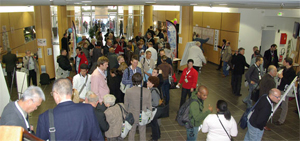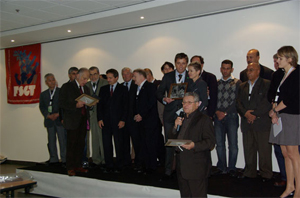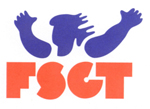 From mixed activities for people with disabilities to supporting the development of activities for children, including the sports association life of seniors and the flourishing of corporate sports initiatives, all aspects of sport and its practice were addressed by the 300 delegates from around the world.
From mixed activities for people with disabilities to supporting the development of activities for children, including the sports association life of seniors and the flourishing of corporate sports initiatives, all aspects of sport and its practice were addressed by the 300 delegates from around the world.
Confronting experiences, exploring opportunities elsewhere and drawing inspiration from them, advising neighbors, and launching ideas of a general nature or on a specific theme, such was the fundamental aim of these three days of study where numerous discussions gave rise to new initiatives that will materialize: developing communication via the web while keeping direct human interaction as a priority, accessibility to different training leading to sports professions, strengthening associative links, broadening access to sustainable development in the sports sector… More than just topics addressed, the slogans of these days, “the future of sport and its preservation,” were the cornerstones of this gathering that dealt with both global issues and sports practices themselves. Among these broad themes, significant attention was paid to 7-a-side football, the leading national activity in terms of the number of licensees and clubs involved. A discipline that, according to specialists, is now developing globally.
Nice and its region: The Eldorado of 7-a-side football in France
Frequently discussed during these meetings, for its unifying role and its socializing aspect, 7-a-side football was the fortunate target of all desires regarding its expansion and the means of its future exportation to all corners of the globe. Rich with its 4,860 players and its 450 registered teams in the senior (ages 17 to 35), veteran (ages 35 to 42), and super veteran (over 42) championships, the Azurean 7-a-side football, headquartered on Smolett Street, has become in a few years the undisputed leader of this sport, both nationally and at the European level, far ahead of Marseille (300 teams) and the entire Paris region (320 teams). Alone, the Alpes-Maritimes account for 19% of the practitioners in France. A variant of the “classic” 11-a-side football that follows simple and specific rules: clubs formed with a minimum of 10 licensees, self-refereeing, tackling is prohibited, kick-ins instead of throw-ins, two halves of 25 minutes each, playing field equivalent to half a standard 11-a-side football field…
These organizational and gameplay characteristics are found in all French FSGT championships but have experienced exponential success on the French Riviera. Launched in 1979 by two volunteers, Joseph Mazarelli and Bernard Nucera, in response to the global constraints encountered in creating and managing 11-a-side clubs, 7-a-side football has since experienced meteoric growth, with the entire department involved (including Monaco), and its development continuously gaining momentum since the 1990s. For Jean-Claude Poirier, co-president of the 06 committee, “7-a-side football represents half of our FSGT members; it has become the flagship activity in our region, although we could develop sectors like Cannes, Antibes, Menton, and Grasse a bit more, where we face challenges with field accessibility and their corresponding time slots. That said, the activity is functioning well and meeting the needs of sport for all. But that doesn’t mean we won’t try to progress further in this activity as well as in all others.”
 An example to follow? The term is not overused as this practice’s omnipresence in Nice and its surroundings is a forerunner for its development in other regions of France. By way of comparison, there currently exists no championship in Gironde or Corsica, 30 teams in the Toulouse region, and in the Gard, 30 clubs in Alsace, poor development in Brittany and the North… The National and International Meetings on Popular Sports in St Etienne thus proposed the Nice experience to other delegations desiring to establish numerous self-refereed championships in their territories. Awareness of the actual and potential success of 7-a-side football has even led to discussions with the International Confederation of Popular Sports (CSIT) about launching and discussing a project for a 7-a-side football club World Cup, where clubs would not be selected exclusively based on their sporting results. This idea, launched by Israeli and Japanese representatives, reached a consensus on the legitimacy of such an event not limited to the competitive aspect of the meeting: international exchanges will develop in the form of partnerships between countries, with the Bouches-du-Rhône committee and their Tokyo counterparts already having successfully tested the formula. Finally, it was shown that creating rugby 7s without kicking in France was largely inspired by its round-ball counterpart in its main guidelines.
An example to follow? The term is not overused as this practice’s omnipresence in Nice and its surroundings is a forerunner for its development in other regions of France. By way of comparison, there currently exists no championship in Gironde or Corsica, 30 teams in the Toulouse region, and in the Gard, 30 clubs in Alsace, poor development in Brittany and the North… The National and International Meetings on Popular Sports in St Etienne thus proposed the Nice experience to other delegations desiring to establish numerous self-refereed championships in their territories. Awareness of the actual and potential success of 7-a-side football has even led to discussions with the International Confederation of Popular Sports (CSIT) about launching and discussing a project for a 7-a-side football club World Cup, where clubs would not be selected exclusively based on their sporting results. This idea, launched by Israeli and Japanese representatives, reached a consensus on the legitimacy of such an event not limited to the competitive aspect of the meeting: international exchanges will develop in the form of partnerships between countries, with the Bouches-du-Rhône committee and their Tokyo counterparts already having successfully tested the formula. Finally, it was shown that creating rugby 7s without kicking in France was largely inspired by its round-ball counterpart in its main guidelines.
What about other sports? Dance, karate, handball, sailing, as well as basketball, water polo, darts, table tennis, indoor football, and softball… all sports underwent thorough analysis to enhance their expansion across all segments of society. In the 06, numerous activities are shared among the 10,000 members holding a license and all-sports insurance, allowing them to juggle between activities. Judo and combat sports, cycling and mountain biking, fishing, bowls, rugby 7s, skiing and mountain activities, gymnastics, and many more are offered to sports enthusiasts in the South-East basin through commissions. Discussions also animate federation leaders regarding the integration of other sports in the Alpes-Maritimes: badminton, and ping pong, physical and sports activities for seniors, volleyball. Not to mention the training aspect, which is constantly evolving and offers numerous preparatory courses for diplomas related to sports professions.
https://www.actufoot06.com/fsgt/
www.fsgt.org
Photos FSGT


